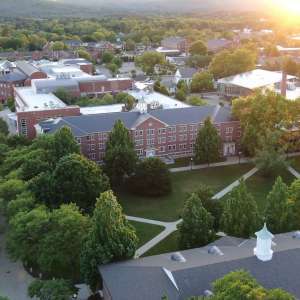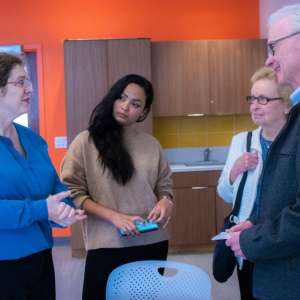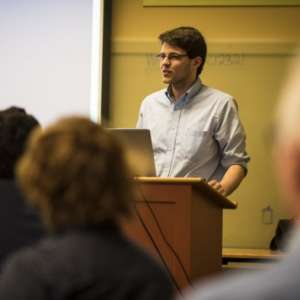Studying Keene's Industrial History
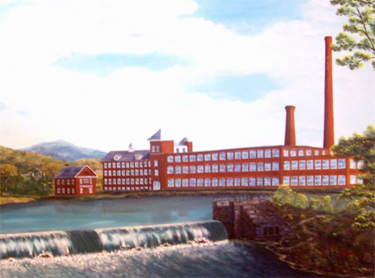
An economics professor at Keene State College for the past 14 years, Dr. Marie Christine Duggan was born in Paris and spent her formative years in Berkeley, CA. Having parents in academia (both teachers at UC-Berkeley) also afforded her the opportunity to travel to different places around the world, attending kindergarten while living in Spain and visiting Venice at the age of 15.
Duggan doesn’t need Rosetta Stone. In addition to enthusiastically absorbing the culture of the many places she’s visited, she’s also demonstrated a knack for picking up the dialect, speaking five different languages.
Duggan initially balked at the idea of following in her parents’ footsteps and becoming a college professor, but soon relented, joining the KSC faculty in 2000 after earning her M.A. and Ph.D. in economics from the New School for Social Research in New York City.
She also acquired her parents’ predilection for research, sinking her teeth into subjects including social economics, class conflict, and discrimination – interests that stem from being among the first students to attend integrated public schools in Berkeley, she says. While Duggan has developed a keen interest in the economic history of Spain and Mexico City over the years, her time on the West Coast spurred an interest in the history of California economics, a topic she has written about. Consequently, her move to Keene triggered an affinity for the Monadnock area and a desire to learn more about the city’s economic history. “This project has helped me put my feet down in Keene,” she said. “At one time, I was always thinking about leaving and returning to California, but getting more involved with this project made me really feel that Keene is home.”
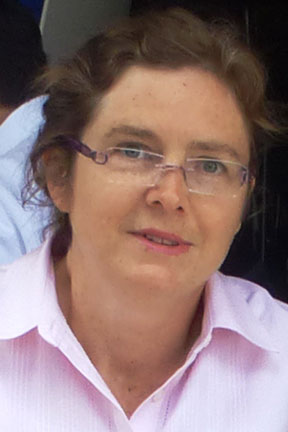
A global economic historian and historian of economic ideas by trade, Duggan said the long-term project on Keene has taken her into uncharted territory.Working with her students, Duggan produced a paper in January 2013 entitled “From Stability to Risk: Industrial Transformation in One Small Town, 1970-1998.” The paper focused on Keene’s big-three firms (Kingsbury Tool Corporation, Markem and Miniature Precision Bearings (MPB) (now Timken), detailing their unique history and analyzing the impact of the recession that brought about changes in the market and the corporate finance structure of each company in the small New England City.
While the significant shift in technology and the firms’ ability to confront and adjust to those abrupt changes were paramount in their research, Duggan and the students also examined transitions in ownership (from family-run to public) and the effect they had on the workers and the community. Duggan noted, “In a town like Keene, where the owners of the firm and workers live in the same town, many executives made moral choices that were good for the community. There’s a lot of pride in Keene and doing the right thing. Some cities fell apart and Keene managed to keep going. Was it just inevitable, or did the social ties between people in this community play a role in keeping things going longer or transitioning more gently?”
Students in Duggan’s US Economic History class collected oral histories from machinists, engineers, and managers to understand industrial change in Keene from 1970 to 2012. Her students then met with executives from some of Keene’s most innovative firms to present their findings.
Connecting Students to Industry Leaders
At a session facilitated by Mary Ann Kristiansen of the Hannah Grimes Center for Entrepreneurship, students were able to present to and speak with local industry leaders, including Ray Anderson, then of Knappe and Koester (and now with Turmoil Inc. of Swanzey), who had given the class a tour of his cutting-edge machine shop, and Don Brehm, who has had a hand in developing a number of Keene companies. “I think it’s very important for students to know the background of industry in Keene and how it’s progressed through the years to include some very world-known technology companies,” said Brehm, who served on the board of the Hannah Grimes Center, including a couple of terms as president. “It’s important for them to know for possible job and internship opportunities and ways to structure their curriculum.”
Speaking recently, Brehm touched on the relationship between owner and workers that made Keene special. “I never considered people worked for me – I considered that they worked with me. I think that was the feeling among most of the businesses.”
“I was really impressed with the leadership of these people—they know they are responsible for all these people’s lives,” said Duggan, who referred to Brehm as the local version of Steve Jobs of Apple fame. “Everybody in their organization gets paid if they lead the firm wisely.”
One of the students involved in the project was Mike Grazewski, a 2013 grad and economics major now working in the financial field. “It was cool to learn that I went to school in a small city that created and manufactured items like lenses and ball bearings that are so important and used in so many different industries,” he said. “Reading is good, but sitting down and speaking with people for a couple of hours who were actually involved with these companies added to the experience.”
Following the informative discussion, Kristiansen applauded the work of the researchers. “It was a stellar performance by the KSC students,” she said, “and Professor Duggan should be commended for taking education into the real world and doing it exceptionally well.”
Begin pull-quote…I think it’s very important for students to know the background of industry in Keene and how it’s progressed through the years to include some very world-known technology companies. …end pull-quote
I think it’s very important for students to know the background of industry in Keene and how it’s progressed through the years to include some very world-known technology companies.” The study of Keene’s industry is ongoing and never stagnant. This past semester, John DiGeronimo, a senior originally from Florida who now calls Keene home, worked on an independent study project with Duggan focusing on Keene’s industry from a finance perspective. Like Duggan, DiGeronimo, who came to Keene after living in several locales, was intrigued to learn about his new home. “I didn’t know who Don Brehm was, but I love learning about innovators and different people who really have a passion,” he said. It’s not strictly about the bottom line.”
Like Brehm, who has had his share of ups and downs when it comes to starting businesses, Keene is a survivor. Through the transformation, the boom and bust cycle, and changes in ownership, the city and surrounding area still manages to be in the fore-front in the manufacturing of ultra-precision machine tools that are used largely in the optic industry, producing parts from molds that are used in smart phones and satellites as well as seeing a way to be a major player in the production of contact lenses.
With innovations like that, it’s no wonder Duggan has decided to offer a course on the subject during the spring semester. Her goal is to open the class up to the general student population, especially those who study architecture, design, and safety. “We’re such a small, tight-knit community,” said Duggan of her adopted hometown. “I started to learn that a lot of people from Keene actually travel around the world for their companies. I had a businessman from Markem in class who went to China, and I realized that one of my students might be going to China someday, even though some of them haven’t even been to New York. It’s a way that our little town has integrated into the world.”


